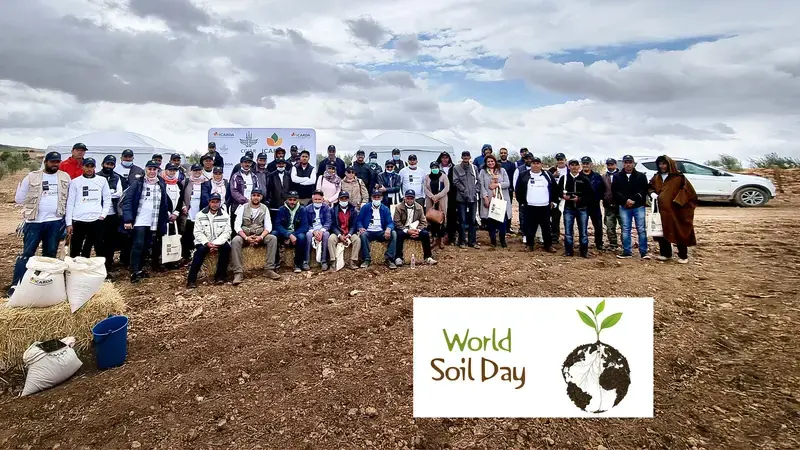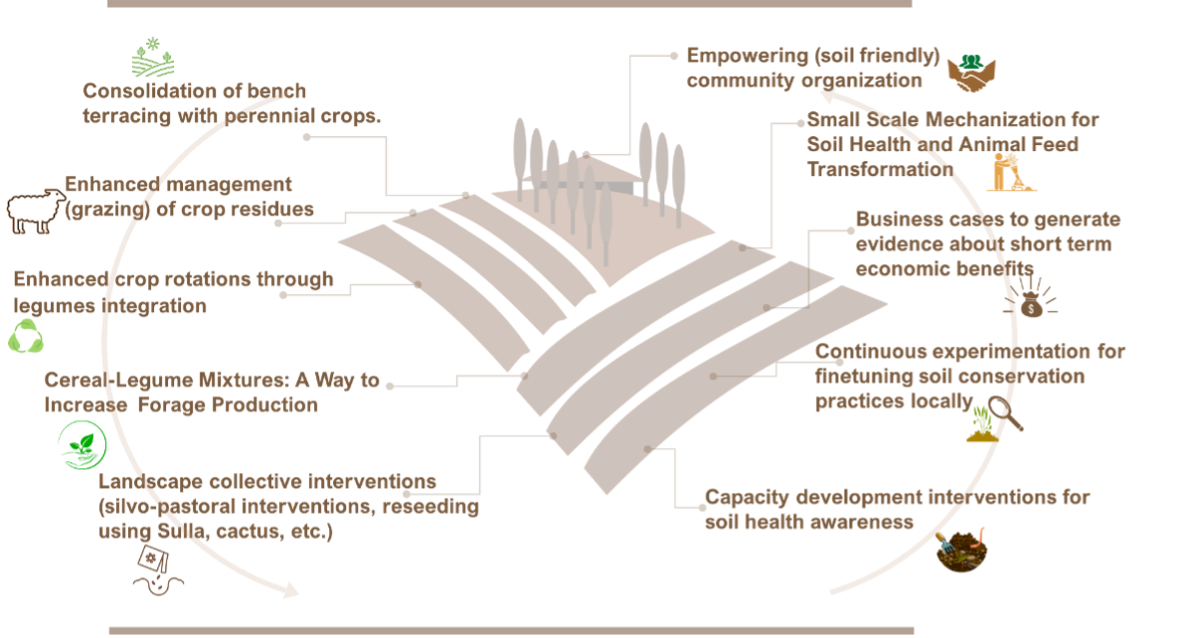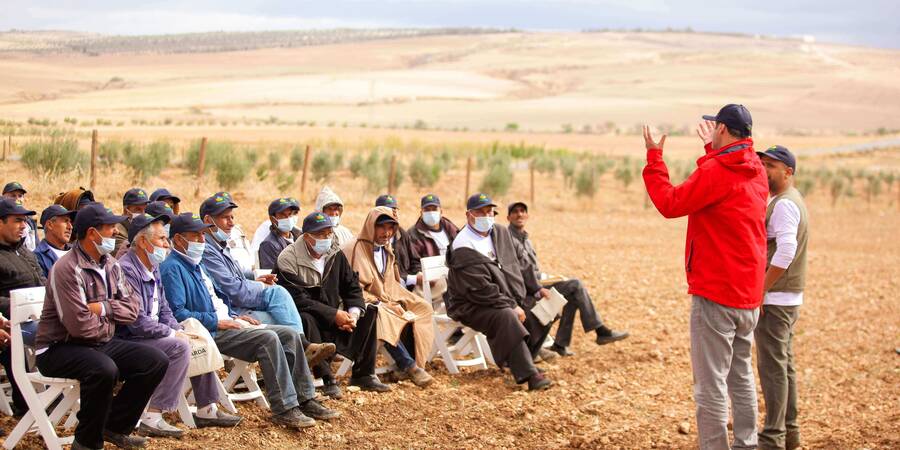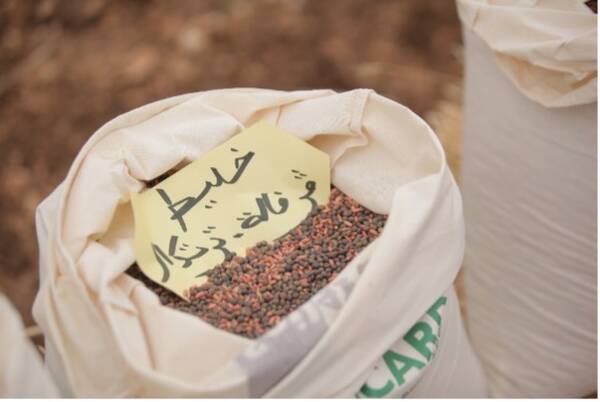Social Soil

The SWC@Scale project is funded by GIZ as part of the PROSOL global program, and carried out alongside partners such as Tunisia’s national agriculture research institutions, Direction générale de l’aménagement et de la conservation des terres agricoles (DGACTA), and Tunisian farmers associations.
The newly launched SWC@Scale project researches and designs a sociotechnical package of affordable and scalable Soil and Water Conservation Technologies (SWCT) to improve soil fertility in diverse farming agroecosystems in North and Central West Tunisia.
Soil health is vital to food systems, yet we are dangerously complacent about its value and resilience. Factors such as climate change and water scarcity, combined with local unsustainable practices such as overgrazing, excessive plowing, and monocropping, are inflicting severe damage to this precious, and finite, resource, especially in vulnerable dry countries such as Tunisia
The new SWC@Scale project aims to reverse this trend in Siliana governorate, Northwest Tunisia, where land degradation is advanced due to inappropriate agronomic practices. Building on previous ICARDA projects and following existing national SWCT practices, the project serves crop-livestock production systems at individual farmer level, and it develops restoration practices on larger areas of communal land, primarily used for agro-silvopastoral production systems (cultivation of trees, shrubs, crops, and livestock within the same site). Land types in the region are highly diversified along with farm sizes and the genders of farmers, so sociotechnical context is essential to identifying targeted approaches.

For example, best SWCT techniques for individual farmers focus on practices such as crop rotations and diversified cropping, integrating livestock into the system, and actions that enhance soil cover, such as conservation agriculture and less grazing of residues.
Restoration of soil over wider areas, such as communal land, needs carefully selected land management options specific to the agroecology of the site, requiring in-depth studies to fully understand the site history and what led to its status of degradation. Researchers can then pick integrated packages that include water harvesting techniques, better-managed grazing practices, mechanical and green consolidation of terraces, and planting hardy native rangeland and forage shrubs and grasses such as cactus and Sulla that fix and improve the soil.
New approaches for better buy-in
The project will involve communities right from the start to generate accurate, ground-up technical, environmental, and economic information about the importance of SWCT practices and demonstrate these at farm level to show how they improve people’s incomes.

Meanwhile, to impress policymakers, it is essential to assess, evaluate, integrate, and promote the long-term benefits of sustainable resources management into economic calculations to demonstrate ‘key change’ aspects of the technology and its long-term sustainability. In this case, the project will sustainably restore around 1500 hectares of degraded land used by about 750 smallholder farmers, with income increases related to the expected higher productivity.
Social soil
Another new aspect of the research is its sociotechnical approach with short-term, ecological income benefits and long-term soil fertility and protection. The project helps farmers better organize themselves into associations, providing them with income-generating activities plus equipment such as pellet machines while training them to plan their activities towards self-independence. The project also trains farmers to valorize environmental actions such as using biomass for animal feed, so less grazing takes place, or using crop residues to improve soil carbon content.

Training for life
By making farmers and authorities knowledgeable about the new technology, they can fully optimize and eventually take over the project, creating and sharing ongoing unique and new knowledge that they generate about the best tools, approaches, and inputs for the job and tailored to the specific settings.
An effective way to share knowledge is through technical Knowledge Hubs (KH) initiated under the responsibility of lead farmers that vertically and horizontally connect farmers to consumers, sellers, suppliers, information and training services, and more. Together they can all discuss subjects such as new machinery, sound input and produce prices, and the best way of sustaining their production systems. They can also access presentations by demonstration farmers, creating self-sustained extension dynamics in the project intervention areas.
Another new research aspect the project delivers is the continual development of e-learning modules by farmers and project researchers. The modules will allow future farmers and extension agents to access, incorporate and develop new, proven knowledge through ICT such as smartphone apps, SMS’s, and Interactive Voice Response (IVR) technology, altogether targeting over 1000 farmers in project regions. Researchers will identify the most popular topics along the way but start with known knowledge gaps in conservation agriculture, erosion control, and soil health. The modules will be the first of their kind that addresses SWC for specific agroecology in Tunisia and individually tailored for men and women farmers, trainers, and members of the public or the private sector.
Communities building and delivering the new knowledge
This ‘living lab’ experience tracks social changes to create informative data through understanding farmers’ responses, perceptions, attitudes towards sustainability. It also monitors the behavior of farmers to see the drivers on their engagement in adopting specific practices, because if they are not keen, something is missing. Lessons learned will be shared with the PROSOL program leadership in Tunisia for broader guidance and implementation.
Ultimately the project hopes to provide the critical data that will make it easier for farmers to enter a pathway to transform local marginal systems into frameworks of sustainable, environmentally sound agricultural intensification that meet the demands of communities and countries while protecting its valuable resources.
